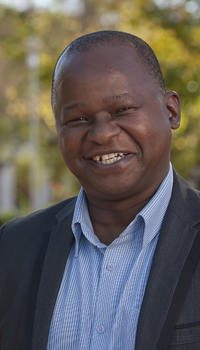Latest News Archive
Please select Category, Year, and then Month to display items
04 April 2024
|
Story Lunga Luthuli
|
Photo SUPPLIED
 Dr Juliet Kamwendo champions gender-inclusive climate action in Africa. Her expertise at the recently held AFR100 workshop highlighted vital steps towards sustainable and equitable development.
Dr Juliet Kamwendo champions gender-inclusive climate action in Africa. Her expertise at the recently held AFR100 workshop highlighted vital steps towards sustainable and equitable development.
Dr Juliet Kamwendo, Lecturer and Programme Director for Gender Studies in the Centre for Gender and Africa Studies at the University of the Free State, is spearheading efforts to integrate gender considerations into Africa's climate restoration agenda. Reflecting on her involvement, Dr Kamwendo stated, "This is particularly crucial, as women make up almost 50% of the population in Africa, and the depletion and degradation of land affect them disproportionately."
She recently served as a gender expert at the AUDA-NEPAD AFR100 workshop in Ouagadougou, Burkina Faso, from 25 to 29 March 2024. This initiative aims to restore forests and degraded land across Africa by 2030, with a focus on gender equality.
The workshop emphasised the integration of gender perspectives into the AFR100 project, acknowledging the disproportionate impact of land degradation on women. Dr Kamwendo's expertise highlighted the need to empower women in climate change interventions, addressing existing gender inequalities exacerbated by environmental degradation.
“Women – who are primarily responsible for household food security and water provision – bear the brunt of environmental degradation, leading to increased workloads, reduced income opportunities, and heightened vulnerability to climate-related disasters. Furthermore, the loss of forest cover and biodiversity further exacerbates the challenges faced by women, particularly in rural areas where they depend heavily on natural resources for their livelihoods,” added Dr Kamwendo.
Her participation highlights academia's crucial role in fostering inclusive and sustainable development, emphasising interdisciplinary collaboration to tackle complex environmental challenges. Through initiatives such as AFR100, stakeholders are working towards a more resilient and gender-responsive future for Africa.
South African citizens are yearning for a good story to tell
2014-03-13
|

Dr Sethulego Matebesi
Photo: Sonia Small |
The 20 Year Review is in essence a continuation of President Jacob Zuma’s State of the Nation Address and the ‘we have a good story to tell’ narrative. The report provides a glowing picture of successes achieved over the two decades. The successes highlighted include the basic human rights enjoyed by South Africans, a marked improvement in economic growth, and the provision of social services such as health care, education and housing. And as expected, the Review is dedicated to Nelson Mandela.
The major accomplishments were made through the strategic policies of the ruling African National Congress (ANC). For example, emphasis has been on improving the lives of South Africans through pro-poor economic interventions, in building social cohesion, investing in economic infrastructure, fighting HIV and AIDS and tuberculosis, which resulted in improved health outcomes.
Generally, the assertions about ‘accomplishments’ have been made against solid evidence and are thus not debatable. What overshadows the 20 Year Review, is the story that is not being told. This is the story of a political economy marred by rampant corruption, high levels of unemployment, declining accountability, and unresponsiveness. This untold story has become the hallmark of President Zuma’s tenure. Meanwhile, the average South African citizen is still yearning for ‘a good story to tell.’
For more political comment or to speak to Dr Matebesi, please call René-Jean van der Berg at +27(0)83 645 5940.